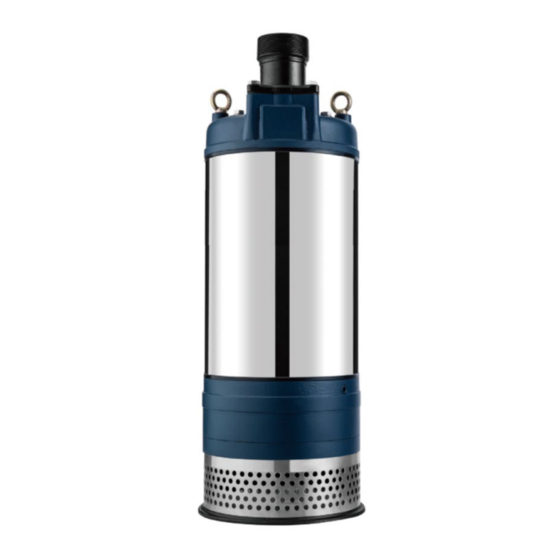
Table of Contents
Advertisement
Quick Links
Advertisement
Table of Contents

Summary of Contents for Stancor WCP Series
- Page 1 ________________________________________________________________________________ Installation, Operation And Maintenance Manual Stancor™ WCP Series Pumps _________________________________________________________________________________ EI-700-011 Rev 1...
-
Page 2: Table Of Contents
Table of Contents Safety Guidelines Safety Information Maintenance Nameplate format Prior to Operation Check the following points upon receipting of your pump: Installation Electrical Wiring Wiring Cable Grounding Wiring Diagrams Operation Maintenance Exploded View Troubleshooting Disassembly and Assembly Appendices: Technical Data: WCP Specifications: WCP Pump Curves: WCP Outline Drawings: WCP... -
Page 3: Safety Guidelines
Safety Guidelines This instruction manual provides you with the information required to safely own and operate your product. Retain these instructions for future reference. The product you have purchased is of the highest quality workmanship and material and has been engineered to give you long and reliable service. - Page 4 DO NOT USE TO PUMP FLAMMABLE OR EXPLOSIVE FLUIDS SUCH AS GASOLINE, FUEL OIL, KEROSENE, ETC. FAILURE TO FOLLOW THIS WARNING CAN RESULT IN PERSONAL INJURY, DEATH AND/OR PROPERTY DAMAGE. During normal operation, this pump is immersed in water. Also, during rainstorms, water may be present in the surrounding area of the pump.
-
Page 5: Safety Information
Do not use the product in the presence of flammable liquids or gases. Always turn off the power, before inspection, maintenance, and adjustment. Never attempt to change the settings of all protective devices without consulting with a STANCOR representative. The product is designed for moving wastewater, raw and clean water. -
Page 6: Maintenance
Maintenance If the pump does not operate properly or trouble shooting doesn’t work, consult your pump dealer or take pump to a Stancor authorized service center. Nameplate format Name Description Serial No. Serial Number Model Pump Model Frequency Power Frequency (Hz) -
Page 7: Prior To Operation
Prior to Operation Check the following points upon receipting of your pump: Is the pump exactly what you ordered? Check nameplate. It is especially important that you check whether the pump is to be used with 50 or 60 Hz. Has any damage occurred during shipment? Are any bolts or nuts loose? Have all necessary accessories been supplied? We recommend that you keep a spare pump on hand in case of emergencies. -
Page 8: Electrical Wiring
Electrical Wiring Check local electrical and building codes before installation. The installation must be in accordance with their regulations as well as the most recent National Electrical Code (NEC). Pump should be connected or wired to its own circuit with no other outlets or equipment in the circuit line. Fuses and circuit breaker should be of ample capacity in the electrical circuit. -
Page 9: Operation
Operation 1. Before starting the pump After completing installation, measure the insulation resistance again as described in Installation. Check water level. If the pump is operated continuously for an extended period in a dry condition or at the lowest water level, the motor protector will be shut off the power. -
Page 10: Exploded View
Exploded View Pos.No Denomination Pos.No Denomination Discharge Shaft sleeve Upper cover Impeller Outer case Pump casing Motor Inlet plate Mech. seal Strainer Seal bracket Base plate Oil seal... -
Page 11: Troubleshooting
Troubleshooting Trouble Cause Remedy Does not start. (1) Power failure (1)~(3) Contact electric power company and Starts, but devise counter-measures (2) Large discrepancy between power source immediately and voltage stops. (3) Significant drop in voltage (4) Motor phase malfunction (4) Inspect electric circuit (5) Electric circuit connection faulty (5) Correct wiring (6) Faulty connection of control circuit... -
Page 12: Disassembly And Assembly
Disassembly and Assembly 1. Disassembly When disassembling pump, have a piece of cardboard or wooden board ready to place the different parts on as you work. Do not pile parts on top of each other. They should be laid out neatly in rows. The “O”... -
Page 13: Appendices
Appendices: Technical Data: WCP WCP-400 HH DS-A28-001 WCP-400 HV DS-A28-009 WCP-1100 HH DS-A28-005 Specifications: WCP WCP-400 HH DS-A28-002 WCP-400 HV DS-A28-010 WCP-1100 HH DS-A28-006 Pump Curves: WCP WCP-400 HH DS-A28-003 WCP-400 HV DS-A28-011 WCP-1100 HH DS-A28-007 Outline Drawings: WCP WCP-400 HH DS-A28-004 WCP-400 HV DS-A28-012... -
Page 14: Notes
Notes Industrial Flow Solutions Operating, LLC • 104 John W Murphy Drive, New Haven, CT 06513, USA • 860-399-5937 • www.flowsolutions.com Stancor™ is a trademark of Industrial Flow Solutions Operating, LLC. All rights reserved.







Need help?
Do you have a question about the WCP Series and is the answer not in the manual?
Questions and answers